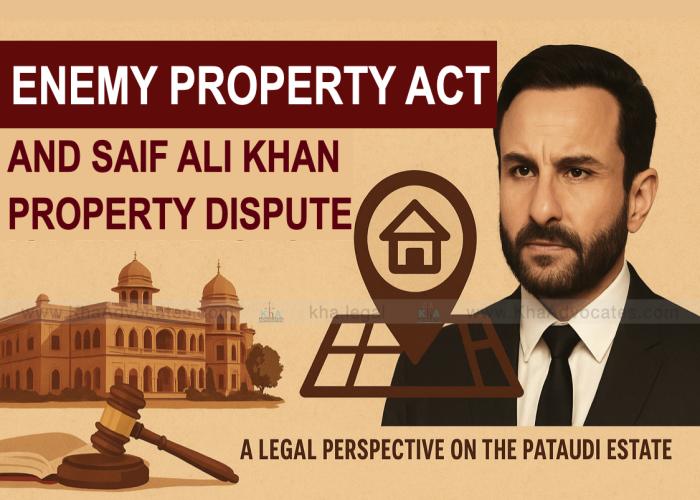
Published on: August 23, 2025 Author: Kabir Hassan, Lawyer
The Enemy Property Act, 1968 has often been in the news due to high-profile property disputes. One of the most talked-about cases involves Bollywood actor Saif Ali Khan and the prestigious Pataudi Estate. While many see this as a family inheritance matter, legally it is much more complicated, as the Enemy Property Act directly governs whether heirs like Saif can claim ownership of certain ancestral assets.
This blog explores the legal perspective on the Enemy Property Act, its relevance to the Pataudi Estate dispute, and how it impacted Saif Ali Khan’s inheritance rights.
The Enemy Property Act, 1968 was enacted by the Government of India after the Indo-Pak wars of 1965 and 1971. It essentially deals with properties left behind in India by people who migrated to Pakistan or China during these wars.
Such properties were taken over by the Custodian of Enemy Property for India.
Heirs of those who migrated were barred from claiming ownership rights.
Even Indian citizens related to the “enemy” were restricted from succession to such properties.
The law was strengthened further in 2017 through an amendment, making it clear that no heir of an enemy can inherit such property, even if they are Indian citizens.
The Pataudi family, a prominent royal household in Haryana, traces its lineage back to Nawab Iftikhar Ali Khan and later Nawab Mansoor Ali Khan Pataudi. The estate included prime landholdings, palaces, and ancestral properties.
The controversy began when it was argued that certain portions of the Pataudi Estate fell within the ambit of the Enemy Property Act due to the migration of some family members to Pakistan.
This created legal hurdles in the inheritance of Saif Ali Khan, son of Mansoor Ali Khan Pataudi and Sharmila Tagore, despite him being an Indian citizen and legal heir.
The legal complications arose because:
• Some of Saif Ali Khan’s relatives, including family members connected to Bhopal and Hyderabad princely states, had migrated to Pakistan.
• Under the Enemy Property Act, properties belonging to those relatives were considered enemy property.
• This meant that even Indian-born heirs like Saif Ali Khan could not automatically inherit certain ancestral properties.
Thus, while Saif was declared the legal heir to parts of the Pataudi Estate, the Enemy Property Act restricted his rights over portions of the ancestral property.
The direct impact of the Enemy Property Act on Saif Ali Khan was significant:
1. Inheritance Restriction – Saif could not freely inherit all properties linked to his ancestors because the law prohibited transfer of enemy property to heirs.
2. Legal Disputes & Delays – The Pataudi family faced litigation and government intervention, leading to a prolonged battle to establish ownership rights.
3. Loss of Royal Assets – Despite being the legal heir, Saif’s rights over parts of the estate were curtailed, preventing him from exercising full control.
4. Symbolic Loss of Heritage – For Saif, the dispute was not only about property value but also about ancestral pride and royal legacy.
This demonstrates how even celebrity heirs are not immune to the far-reaching consequences of the Enemy Property Act
From a legal standpoint, the dispute highlights several critical issues:
Conflict between Succession Laws & Enemy Property Act
Normally, under the Hindu Succession Act or personal laws, a son inherits his father’s property.
However, the Enemy Property Act overrides succession rights, making heirs powerless if the property is classified as enemy property.
Doctrine of Public Policy
The Act is based on national interest, preventing properties linked to “enemies” from being exploited.
But, in practice, it often impacts Indian citizens like Saif Ali Khan, raising concerns of fairness.
Judicial Interpretations
Indian courts have consistently upheld the supremacy of the Act, limiting the scope of inheritance claims.
This shows how special laws override general inheritance provisions.
The Pataudi Estate dispute serves as a cautionary tale for families dealing with ancestral properties. Key lessons include:
Title Verification is Crucial – Before claiming or buying any property, ensure it is not under the Enemy Property Act or other restrictions.
Legal Documentation Matters – Proper succession deeds, wills, and title clearances can reduce future disputes.
Seek Legal Expertise Early – Corporate lawyers and property law experts can prevent disputes from escalating into decades-long battles.
NRI Families Must Be Extra Careful – Many NRIs unknowingly inherit properties linked to enemy properties, exposing them to long litigation.
At KHA Advocates, we specialize in:
Property Title Verification – Ensuring properties are free from legal encumbrances before purchase or transfer.
Inheritance & Succession Advisory – Drafting wills, succession certificates, and family settlements to secure property rights.
Dispute Resolution & Litigation Support – Representing clients in property disputes, including those under special laws like the Enemy Property Act.
NRI Property Services – Helping NRIs manage, protect, and transfer their properties in India.
If you’re facing property disputes or inheritance complications, our expert property lawyers can safeguard your rights.
The Enemy Property Act was designed to protect national interests but has had profound implications on individual inheritance rights. The Saif Ali Khan Pataudi Estate dispute is a high-profile example of how this law can prevent rightful heirs from accessing ancestral property.
For business owners, heirs, and NRIs, the key takeaway is clear: always seek legal due diligence and expert advice before claiming, buying, or transferring property
👉 If you need guidance on property disputes, connect with KHA Advocates today and protect your rights before it’s too late.

